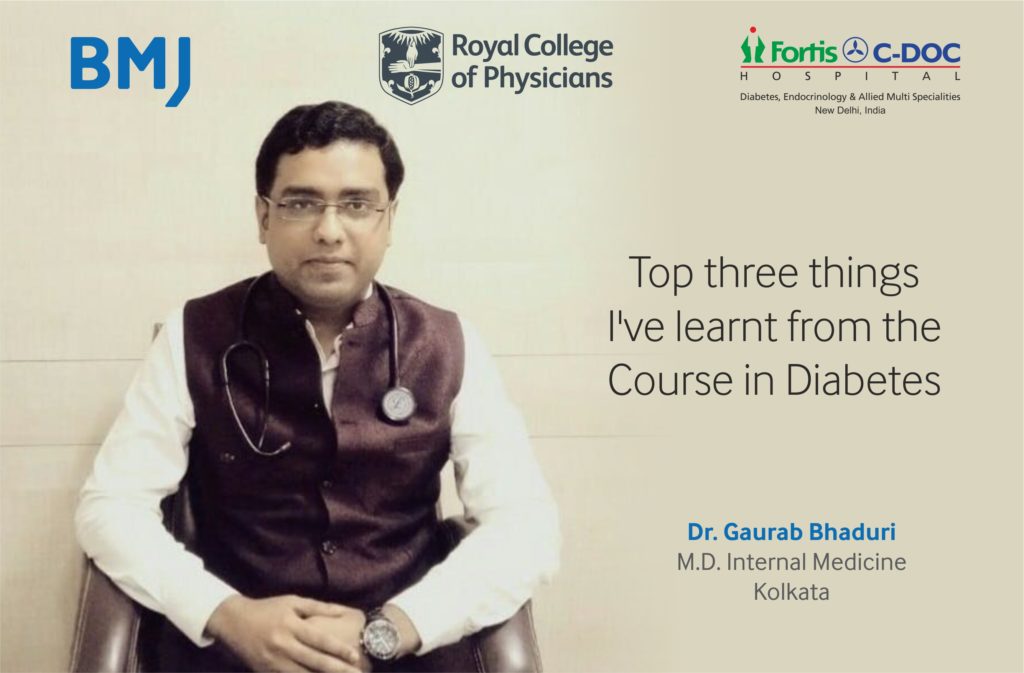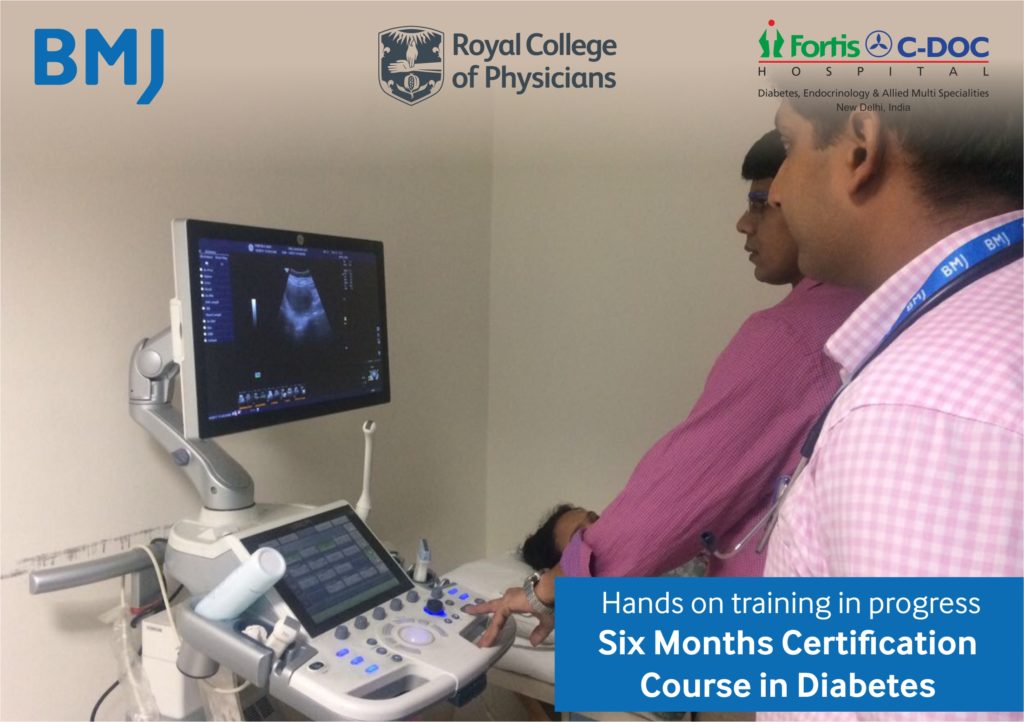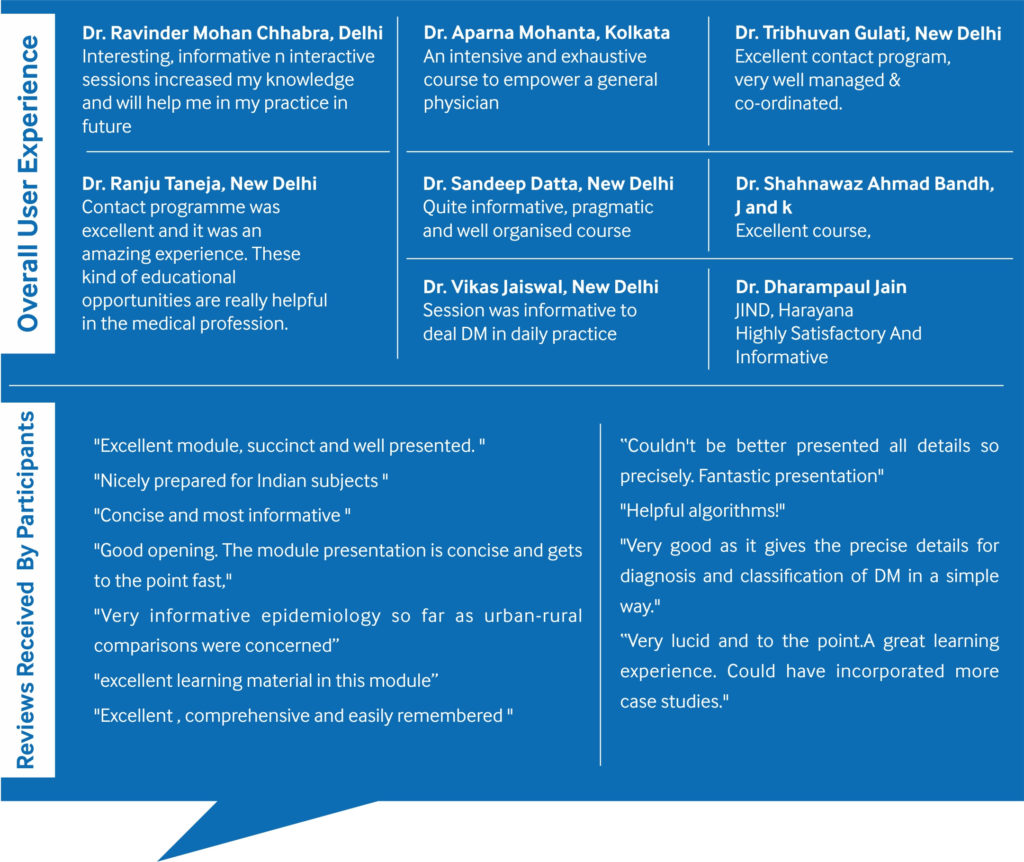 Dr. Gaurab Bhaduri, M.D. Internal Medicine, Kolkata.
Dr. Gaurab Bhaduri, M.D. Internal Medicine, Kolkata.
Hear from our candidate: Course in Diabetes
 Dr. Gaurab Bhaduri, M.D. Internal Medicine, Kolkata.
Dr. Gaurab Bhaduri, M.D. Internal Medicine, Kolkata.
Hands-on training: Course in Diabetes
 Hands on Training is an essential component of the Six Months Certification Course in Diabetes. This training is rigorous, intensive and structured. We have commenced enrollments for the next batch of the course. Limited seats are available - register today at http://educationindia.bmj.com/#sign-up[/caption]
Hands on Training is an essential component of the Six Months Certification Course in Diabetes. This training is rigorous, intensive and structured. We have commenced enrollments for the next batch of the course. Limited seats are available - register today at http://educationindia.bmj.com/#sign-up[/caption] Feedback from our course participants
 We have received encouraging feedback for the Six Months Certification Course in Diabetes
"A very nice introduction to prevelance, demographic influence, high risk groups and possible complications."
"Local epidemiology details are well elaborated "
"Unit 1 is a well designed module provided insight about global burden, prevelance & distinctive features of diabetes in Asian Indians."
"Essential knowledge related to pre-diabetic assessment .awareness in simple way,thanks for this knowledge .start one year or two diploma in preventive cardiology"
"Comprehensive information. helpful for clinical services and research also"
Enroll today for the Six Months Certification Course in Diabetes. Register now at http://educationindia.bmj.com/#sign-up
We have received encouraging feedback for the Six Months Certification Course in Diabetes
"A very nice introduction to prevelance, demographic influence, high risk groups and possible complications."
"Local epidemiology details are well elaborated "
"Unit 1 is a well designed module provided insight about global burden, prevelance & distinctive features of diabetes in Asian Indians."
"Essential knowledge related to pre-diabetic assessment .awareness in simple way,thanks for this knowledge .start one year or two diploma in preventive cardiology"
"Comprehensive information. helpful for clinical services and research also"
Enroll today for the Six Months Certification Course in Diabetes. Register now at http://educationindia.bmj.com/#sign-up
Top Six Reasons to Enroll for the Six Months Certification Course in Diabetes
- This is a comprehensive course spanning theory, assessment, and contact programs – the content is peer reviewed, relevant for South Asian population. You can view more about the units in our course here
- The course developed by national and international experts. Our course directors are Dr. Prof Anoop Misra (Chairman, Fortis-C-DOC Hospital) and Dr Dean Jenkins, (BMJ, UK).
- Our learning pedagogy is unique - it comprises of a mix of online and face-to face learning. We have high quality interactive units with videos (basic, intermediate and advanced). Our two hands on training sessions allow you to interact with our faculty members, giving you insights, knowledge and information far beyond than an online learning environment.
- The course designed to improve your daily practice, enhance confidence and improve patient safety. The carefully constructed contact program curricula for developing core clinical skills.
- Our course is endorsed by the Royal College of Physicians, (RCP) bringing to you a collaboration of three powerful names in medicine, BMJ, Fortis C-DOC and RCP, as part of your course experience.
Course in Diabetes: Tailor Made for You
- The course provides you access to our world-class content designed by few of the most renowned names in diabetes - Fortis C-DOC and BMJ.
- The hands on training sessions facilitates interaction with faculty members - Ask your questions right away!
- The curriculum tailor made for audiences in the Indian subcontinent -carefully reviewed and quality controlled by top experts from UK
- Our learning pedagogy (online plus contact programs) ensures the right mix of faculty interaction and self learning.
Are you looking for a course in diabetes?
- How can a diabetes course help me?
- I am a private practitioner, how will this course help me?
- I am a MBBS student, is this course relevant for me?
- I am already managing diabetic patients, how can this course help me?
Introduction: Six Months Certification Course in Diabetes
- Online and supplemented by contact programs at the Fortis C-DOC Hospital, New Delhi.
- Comprehensive - spanning theory, assessment, and hands-on training
- Developed by national and international experts.
- Interactive: 6 high-quality interactive units with videos (basic, intermediate and advanced)
Diabetes. ED
Hypogonadism and Erectile Dysfunction: Implications in Diabetes Ritesh Gupta Summary: With the growing epidemic of diabetes, a huge burden of its complications has surfaced globally as well as in India. Most of these complications affect vital organs like heart, kidney, brain, eyes, nerves etc. and are the focus areas in terms of prevention and management. However, erectile dysfunction (ED) as a complication of diabetes often does not receive as much attention. Several factors like hesitation and embarrassment on part of either patient or physician, incorrect perception of ED being an age related ‘normal’ phenomenon and lack of understanding about the underlying serious disease are responsible for suboptimal identification and management of this disorder. The prevalence of ED in diabetes has been variously reported to be between 20-85%, depending on the duration of diabetes, age of study population and the definition of ED. The prevalence of ED was reported to be 28% in diabetics and 10% in nondiabetics in Massachusetts Male Ageing Study. In a recent study from Italy, the prevalence of ED was 43% in 1503 men with newly detected T2DM (duration < 2 years). There is only one study from India (Bikaner, Rajasthan) in which the prevalence of ED was reported to be 78% in 50 patients with diabetes. Evaluation of a diabetic patient with ED should include a careful history with psychological evaluation. International Index of Erectile Function (IIEF-5) is a useful tool to detect and grade ED. Physical examination should include assessment of secondary sexual characters, testicular size and any penile deformity or plaque. Most patients will need a hormonal evaluation with measurement of serum testosterone and prolactin. Dynamic Doppler study of penis after either intracavernosal alprostadil or oral sildenafil is needed occasionally. There are two management goals in a patient with diabetes who presents with ED. The primary and immediate aim is to treat his disability. But what is equally important is to uncover an underlying disorder like hypogonadism or cardiovascular disease. It is now well recognized that ED is a marker of widespread endothelial dysfunction in several vascular beds and may precede the onset of coronary artery disease. The recent Joslin Medalists Study of longstanding (>50 years) type 1 diabetics reported a strong relationship between sexual dysfunction and cardiovascular disease. In a prospective study of more than 2000 patients with diabetes with no cardiovascular disease, those with erectile dysfunction had a significantly higher risk of an incident cardiovascular event. Therefore ED has emerged as a risk factor for coronary artery disease and its presence provides an opportunity for primary prevention. Any patient with diabetes with erectile dysfunction should have a cardiovascular risk assessment and those with very high cardiovascular risk may have a coronary evaluation by exercise testing or coronary calcium scoring. A significant number of diabetic patients with erectile dysfunction have hypogonadism or low serum testosterone levels. There is some evidence that treatment with testosterone in diabetic patients with hypogonadism improves insulin sensitivity and glycemic control, however robust and long term evidence is lacking. Nevertheless, there are other benefits to be derived from testosterone replacement like improvement in libido and sexual function, as well as in bone density, muscle strength and cognition. Endocrine Society recommends testing of serum testosterone levels in all patients with type 2 diabetes. Erectile dysfunction in diabetic patients can be treated as in nondiabetics. Usually, PDE-5 inhibitors are the first line agents in treatment. These drugs can be used safely in diabetes; however care should be taken about interaction with antihypertensive drugs and nitrates. These drugs are generally used on an as needed basis; however daily low dose tadalafil has been used with good success. In patients who fail to respond to PDE5 inhibtors, the options are intracavernosal injections of Alprostadil, intraurethral Alprostadil, vacuum device and penile prostheses. About the Author Dr. Ritesh Gupta is a practising Diabetologist and Endocrinologist in New Delhi. He is currently Additional Director, Head - Clinical Operations & Senior Consultant at Fortis C-DOC, a Centre of Excellence for Diabetes, Metabolic Diseases and Endocrinology, located at Chirag Enclave. Dr. Gupta completed his MBBS and MD from the All India Institute of Medical Sciences (AIIMS) in New Delhi. He then spent three years as a Senior Resident in the Department of Medicine at AIIMS, followed by two years as Senior Resident in the Department of Cardiology and as Internist at Escorts Heart Institute, New Delhi. Subsequently, Dr. Ritesh worked for a total of five years at Apollo Clinic (Noida) and Vinayak Hospital (Noida). Just prior to joining Fortis C-DOC in Jan 2011, he had a two-and-half-year stint as Consultant in the Department of Diabetes and Metabolic Disease at Fortis Flt. Lt. Rajan Dhall Hospital (Vasant Kunj).Management Treatment of Diabetes Mellitus
Diabetes increases the risk for disorders that predispose individuals to coronary artery, nephropathy, infection, cerebrovascular and peripheral vascular disease, and lower-extremity amputations.
Successful treatment is a major key factor to long-term health, and achieving balanced diabetes treatment can be the key to living with both type 1 and type 2 diabetes.
Treatment is different for each individual, it varies not only the type of diabetes, but also more individual-specific diabetic treatment differences. The aim of diabetes treatment is to keep blood glucose levels as near to normal as possible. Training in self-management of diabetes is an important part of diabetes management. Treatment should be agreed on an individual basis and address medical, psychosocial and lifestyle issues.
Management of Type 1 diabetes treatment is a daily activity. Lack of insulin production by the pancreas makes management of Type 1 diabetes difficult.
Treatment requires a strict regimen that typically includes a carefully calculated diet, planned physical activity, multiple daily insulin injections and home blood glucose testing a number of times per day.
To know more about the diabetes and our new course in diabetes write us at marketing.india@bmj.com .
